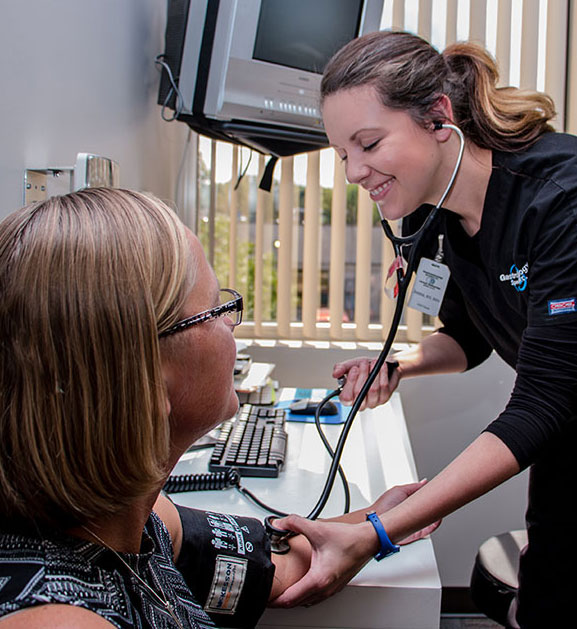Every day more than 30 million people take over-the-counter and prescription drugs known as nonsteroidal anti-inflammatory drugs (NSAIDs) for relief from pain, headaches and arthritis.
These drugs have been around for a long time and have benefited many people. Although they are generally safe, NSAIDs, like all drugs, do have some potential side effects.
Many people don’t know that NSAIDs can cause problems ranging from mild stomach upset and pain to serious stomach bleeding and ulcers (holes in the lining of the stomach) and even death. There is no medical test that can tell for sure if you will develop a problem, and in most cases, these problems can happen without warning. In fact, serious side effects of NSAIDs, such as stomach bleeding, result in more than 100,000 hospitalizations and thousands of deaths each year in the U.S.
What Are NSAIDs?
NSAIDs are pain relievers that reduce pain and inflammation. Aspirin is the most commonly used NSAID. About 20 NSAIDs are available with a doctor’s prescription.* They include drugs such as celecoxib (Celebrex®), diclofenac (Voltaren®) and nabumetone (Relafen®). Three prescription NSAIDs—ibuprofen, naproxen and ketoprofen—also are available over-the-counter. The over-the-counter versions of these drugs are better known by names like Advil®, Motrin®, Aleve® and Orudis®.
The only difference is that prescription versions are a higher strength than those purchased over the counter. Other examples of NSAIDs include products with aspirin that are available over the counter, like Bayer® and Excedrin®. NSAIDs also are found in common cold and flu medications such as Advil Cold and Sinus®, Motrin IB Sinus®, and Aleve Cold and Sinus®. (Look for aspirin, naproxen or ibuprofen on the box or bottle to find out if your medicine contains an NSAID.)
How Do NSAIDs Cause Stomach Problems?
Problems caused by NSAIDs can range from mild stomach upset to stomach bleeding and ulcers. These problems occur because NSAIDs stop a substance in the body that protects the lining of your stomach from damage. Some people are at higher risk than others for stomach problems.
Are You at Risk for NSAID-Related Stomach Problems?
Everyone who takes NSAIDs is at some risk for developing a stomach problem. Below are some factors that doctors think are “high-risk” and may make you most likely to have serious side effects.
To find out if you fall within this high-risk group, fill out this simple risk checklist. Mark all that apply to you.
Personal Risk Factors
- Over the age of 60
- Have had previous ulcers
- Take steroid medications (such as prednisone)
- Take blood thinners (such as warfarin or Coumadin®)
- Consume alcohol on a regular basis
- Take NSAIDs in amounts higher than recommended on the bottle or by the doctor
- Take several different medications that contain aspirin and other NSAIDs
- Take NSAIDs for long periods of time
If you’ve checked any of the boxes in the checklist, take this brochure to your next doctor visit. Talk with your doctor about how to lower your risk. Many people who take over-the-counter NSAIDs take more than the recommended dose.
This can happen by:
- Taking the next dose sooner than directed on the label.
- Taking more tablets or capsules at a single time than recommended.
- Taking more than the recommended number of doses per day.
- Taking several different medications that contain aspirin and other NSAIDs at the same time.
Even taking small amounts of over-the-counter NSAIDs can increase your risk of developing stomach problems. This includes taking daily, low-dose aspirin to prevent a heart attack or stroke.
NSAIDs and Cardiovascular Risks
Recent studies indicate that NSAIDs (except for low-dose aspirin) may increase the chance of heart attack or stroke. If you have heart disease, heart disease risk factors, such as high blood pressure, or are taking NSAIDs for long periods, talk to your doctor about cardiovascular risks and NSAIDs.
The Warning Signs
In addition to knowing your risks, it’s important to know the signs of a serious stomach problem. See your doctor immediately if you experience any of the following:
- Stomach pain
- Dark black, tarry or bloody stools
- Vomiting of blood or matter that look like coffee grounds
However, remember that about 80 percent of people who have a serious stomach problem as a result of taking an NSAID have no warning symptoms. Problems can even occur within one week of starting to take these pain relievers.
It is also important to know the signs of a heart problem. See your doctor immediately if you experience either of the following:
- Chest pains
- Shortness of breath
Lower Your Risk
There are steps you can take to lower your risk for developing a serious stomach problem. Here are some important tips to guide you when taking any over-the-counter or prescription NSAID:
Know your personal risk factors (review the risk checklist).
- Since problems can develop even if you do not have any of the common risk factors, talk to a doctor before you begin taking any medication. Also ask questions and tell your doctor if you have any side effects.
- Read the label on your medications and follow the instructions. Know all the ingredients in your medications, how much to take (dose) and length of time (duration) you can safely take the product. Talk with your doctor before taking any pain reliever for more than 10 days.
- Take a medication only as directed and know its side effects. Look for side effects on the label or box of every medication bottle.
- Never use prescription and over-the-counter pain relievers at the same time unless directed by your doctor.
- Write down all medications and dietary supplements that you are taking. Be sure to include all vitamin, mineral and herbal supplements. Share the list with your doctor; they can help you avoid drug interactions or ingredient duplications.
- Avoid or limit use of alcohol when taking any pain medication.
- All NSAIDs can cause serious stomach problems but studies have shown there is a range of risk. Some NSAIDs, such as celecoxib, may be tolerated better than others by some people. You should talk to your doctor or pharmacist for more information and about which NSAID is best for you.


